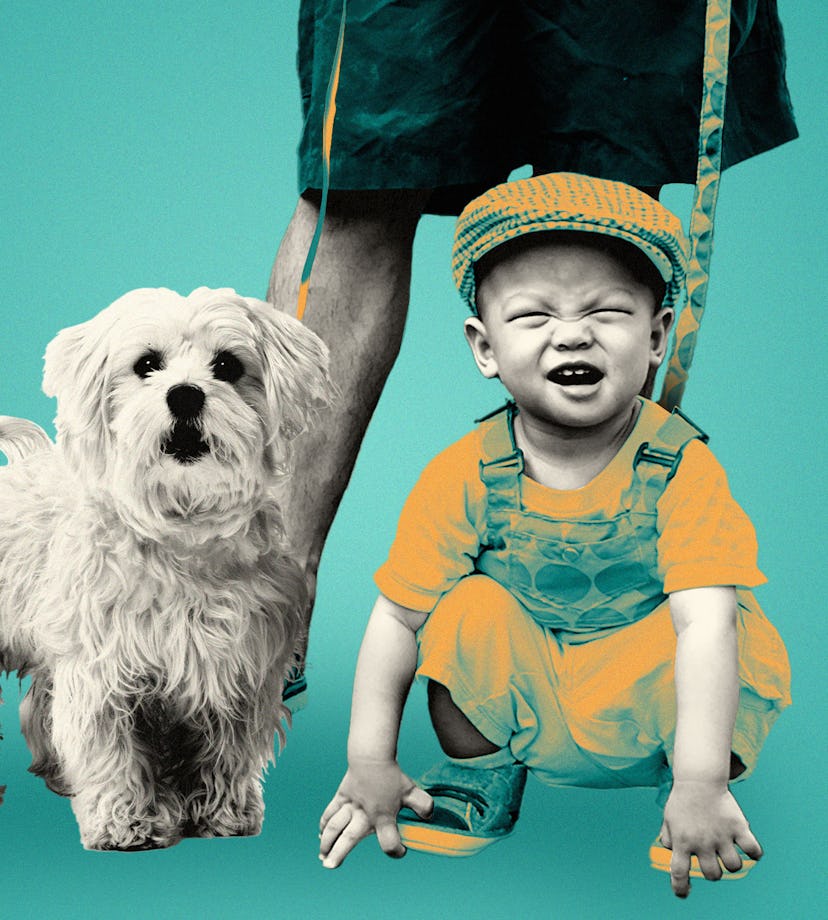Child Leashes Deserve All The Hate They Get, Experts Say
But not for the reasons you might think.

There’s a lot of parent-shaming that results from using a child leash. On the surface, yes, kids aren’t dogs, so seeing them on a children’s leash is likely to result in some backlash. But when you’re, say, navigating crowds at Disney World with small children and have the imminent fear you might lose one of them, a child leash’s appeal is understandable. According to experts, however, you should find another way than a kid leash, toddler leash, baby leash, or children’s leash — and not because they make your child look like a harnessed canine.
“I get it, I have four children and some of them are energetic. And at times I’ve found it difficult to keep them all close,” says Neal Horen, Ph.D., a research instructor at the Center for Child and Human Development at Georgetown University. But, he says, children may interpret being tethered to you via a child leash or harness as a form of aggression.
To a child, getting their leash yanked on when they wander too far feels similar to getting hit, Horen says. Not to mention that if you accidentally pull back too hard on the leash, your child could fall off balance and get hurt. And if the leash gets wrapped around their neck, it could be a choking hazard.
However, it’s important to note that child leashes and their effects, both physically and psychologically, are not well-studied. So it’s impossible to say how many children have been injured by child leashes and how exactly or even if their use damages a child’s psyche.
But all in all, Horen says, tugging on a child leash isn’t all that different from yanking on a kid’s arm when you want them to move or otherwise trying to physically control their movements — all of which can cause issues to your relationship with them.
“It can become less about what its original intent was, to keep the child safe, and more about a power struggle between child and parent,” Horen says. “If you’re yanking your child back on a leash, the child might start to resent you for being physically aggressive.”
More importantly, baby leashes and harnesses don’t really teach your child anything. When we’re raising our kids, Horen says, we’re always looking for opportunities trying to teach them life skills. “I’m not quite sure how a leash helps them learn any of these skills,” he says.
Teaching your kids to stay close and not run off shows them how to control their impulses when they see something they find shiny and bright. In turn, the leash might be holding them back, in a metaphysical sense in addition to a literal one.
It also sends a negative message to your child that could hurt their self-esteem. “You don’t see adults wearing leashes, only dogs,” says Horen.
What to Use Instead of a Child Leash
But what if you’re in a crowded place with more than one kid under the age of 5? According to Howard Pratt, DO, a child psychiatrist in Miami, Florida, if you decide to take that many small children to an amusement park, it’s all about the preparation. Make sure your kids know that when they spot Mickey or Minnie, they can’t jolt toward them without a parent knowing where they are, and they can’t run off to their favorite ride and risk getting separated from the family. Remind them that we hold hands when we’re caught in a crowd. For the kids who are too young to understand, a stroller might be a good option.
But although laying out a plan before you go helps, rules need to be implemented every day to have an impact. So practice in a lower stakes scenario before you get to Disney, and reinforce your children’s good behavior. “They need to understand that their behavior should be the same at the grocery store as it is at Disney World,” says Pratt.
In the end, you should be asking yourself why you’re using a leash on your child and whether you can get that same result by other means. “Good parenting can solve way more problems than any leash ever could,” Pratt says.
This article was originally published on